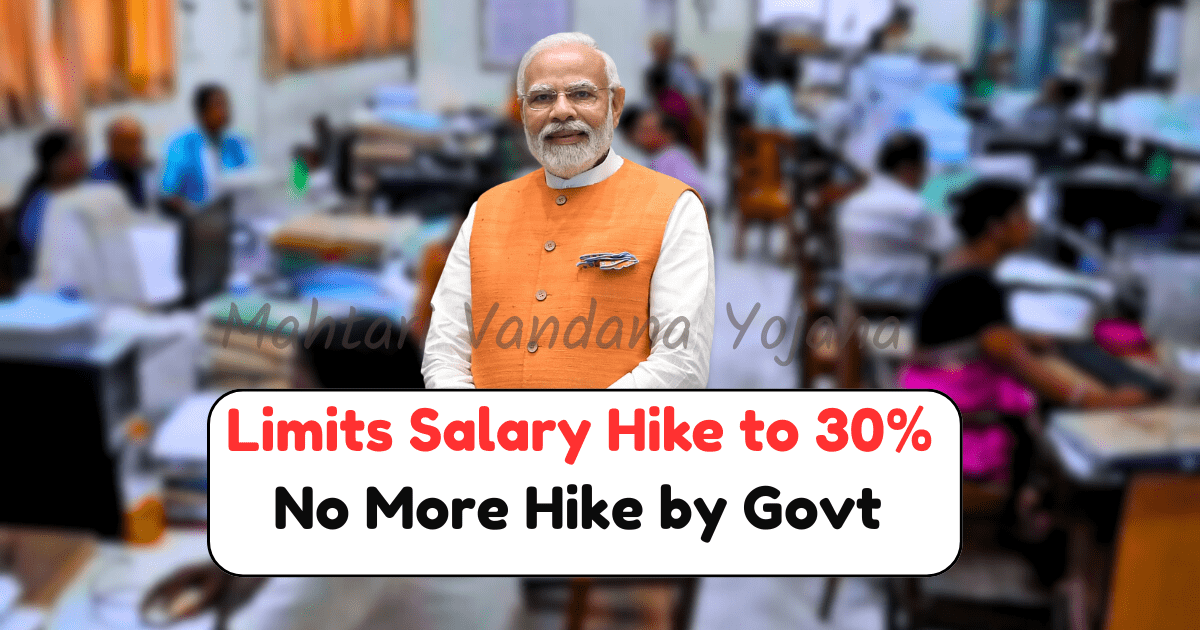8th Pay Commission’s recent announcement: If you’ve been following the latest buzz in the world of central government salaries, you’ve probably heard about the 8th Pay Commission’s recent announcement. The headline has grabbed attention: a salary hike capped at 30%. But what does this mean for central workers and their families? Let’s dive into the details and break it down in simple terms.
Table of Contents
Understanding the 8th Pay Commission
First things first, what exactly is the 8th Pay Commission? Well, these commissions are set up by the government every few years to review and recommend changes to the salary structures of central government employees. They’re pretty important, as they directly affect the paychecks of millions of workers across the country.
The role of the Pay Commission is multifaceted. Not only does it assess the current economic situation of the country, but it also considers factors such as inflation, fiscal deficit, and the overall economic growth rate. This comprehensive analysis ensures that the recommendations are not only beneficial for the employees but also sustainable for the government’s budget.
Now, the big news is that the 8th Pay Commission has recommended a salary hike limit of 30%. You might be thinking, “Hey, a raise sounds good!” But there are some nuances to consider.
The Impact on Central Workers
The proposed 30% limit on salary hikes is a bit of a double-edged sword. On one hand, any raise is welcome news. On the other, is 30% enough to keep up with inflation, rising costs, and other economic factors?
For many central workers, especially those in lower pay bands, this cap is raising eyebrows. They are concerned that this limit might not adequately address their financial needs. After all, the cost of living isn’t exactly going down, is it?
It’s important to understand how this increment translates into real-world scenarios for different categories of employees. Those in higher pay bands might feel less of a pinch compared to their counterparts in the lower bands, as their increased expenditure on essentials like housing and health care is proportionally higher.
Real-Life Implications
Imagine you’re a central government employee who’s been working hard for years. You rely on these pay commission revisions to keep up with life’s expenses. A 30% increase might sound like a lot, but when you break it down, it may not stretch as far as you’d hope.
Let’s say your current salary is ₹50,000 per month. A 30% increase would bump it up to ₹65,000. It seems decent until you consider housing, education, healthcare, and other essentials. Suddenly, that raise starts to feel a bit tight, doesn’t it?
For instance, with the urban housing market prices escalating, the cost of renting or buying a home is a significant expenditure. Similarly, the education sector has seen a surge in fees, making it challenging for parents to provide quality education for their children. Healthcare expenses, which have been rising due to inflation and the increasing cost of medical services, add another layer of financial stress.
Comparative Data: Previous Pay Commissions
To put the current commission’s recommendations into perspective, let’s take a look at how previous pay commissions have handled salary hikes:
| 6th Pay Commission | 2006 | 21% |
| 7th Pay Commission | 2016 | 23.55% |
| 8th Pay Commission | 2023 | Up to 30% |
As you can see, the 8th Pay Commission proposes the highest potential hike in recent years. But whether it’s sufficient remains a matter of debate.
The increases in previous pay commissions were also met with mixed reactions. For instance, the 7th Pay Commission was criticized for not adequately addressing the discrepancy between public and private sector salaries, especially at higher levels. Despite these criticisms, the extent of the hike in the 8th Pay Commission is a step towards addressing these disparities.
Economic Context: Inflation and Cost of Living
One of the key reasons why the 30% cap is under scrutiny is the current economic climate. Inflation rates are rising, and the cost of living is soaring. Everyday expenses like groceries, utilities, and transportation are taking a larger chunk of people’s salaries.
The Consumer Price Index (CPI), which measures the average change in prices over time that consumers pay for a basket of goods and services, has shown a steady increase. This means that even with a salary hike, the purchasing power of the employees may not see a significant improvement.
The government needs to strike a balance between providing fair compensation and managing the nation’s budget. It’s a tough nut to crack, believe me.
Moreover, the global economic conditions also play a role. With the aftermath of the pandemic and geopolitical tensions, the economic landscape is more volatile than ever, further complicating fiscal planning. The government’s fiscal policies aim to maintain a delicate balance between economic growth and inflation control, which might explain their cautious approach to salary increments.
Future Prospects
[Related-Posts]
Looking ahead, central workers are hoping for more robust salary adjustments that reflect the real-world economic challenges they face. Will the government take additional steps to address these concerns? Only time will tell.
In the meantime, staying informed and understanding these changes can help workers plan their finances better. After all, knowledge is power!
There’s also the aspect of technological advancement and productivity. As the government implements automation and digitalization initiatives, there might be shifts in the workforce’s structure. This could potentially lead to changes in job roles and the type of skills in demand, impacting salary structures in the future.
FAQs
Q: What is the 8th Pay Commission?
A: The 8th Pay Commission is a government-appointed panel that reviews and recommends salary structures for central government employees.
Q: How much is the salary hike recommended by the 8th Pay Commission?
A: The 8th Pay Commission has proposed a salary hike limit of up to 30% for central government employees.
Q: Why is the 30% salary hike cap controversial?
A: Many believe the 30% cap may not be sufficient to keep up with inflation and the rising cost of living, especially for lower-income employees.
Q: How does the 8th Pay Commission’s recommendation compare to previous commissions?
A: The 8th Pay Commission’s proposed hike is higher than the 6th (21%) and 7th (23.55%) commissions, but whether it meets current economic needs is debated.
Additional Insights: The Broader Implications
Beyond the immediate impacts on personal finances, the recommendations of the 8th Pay Commission have broader implications for the national economy. Government spending on salaries forms a significant part of public expenditure, and changes in this area can influence economic growth, consumption patterns, and even inflation rates.
When government employees receive salary hikes, their increased purchasing power can lead to higher demand for goods and services, thus stimulating economic activity. However, if these increments are not aligned with productivity improvements, they can contribute to inflationary pressures. This is a critical point for policymakers to consider, as uncontrolled inflation can erode the real value of income gains.
The decisions made by the Pay Commission also have implications for the private sector. Often, compensation trends set by the government sector can influence salary benchmarks within private companies, particularly in industries where skills and competencies overlap. As such, the private sector closely monitors these developments to align their compensation strategies accordingly.
Furthermore, the Pay Commission’s recommendations can also impact labor markets. Competitive salary packages in the government sector can attract talent from various fields, affecting the availability of skilled professionals in other sectors. This is particularly relevant in areas such as engineering, healthcare, and education, where government and private sectors often compete for the same talent pool.
The Pay Commission’s role extends beyond merely determining salary hikes. It is also tasked with reviewing and recommending changes to other aspects of compensation, such as pension schemes, allowances, and benefits. These components are integral to the overall compensation package and play a vital role in employee satisfaction and retention.
As we look towards the future, the implementation of the 8th Pay Commission’s recommendations will be closely watched. Employees, policymakers, and economists alike will be keen to observe how these changes unfold and what impact they have on the broader economic landscape. The hope is that these adjustments will not only address immediate financial concerns but also contribute to a more sustainable and equitable economic environment for all stakeholders involved.
Click here for More details in Official Site
Keep All Your Love And Support With Me Always STAY SAFE SATAY HEALTHY.






